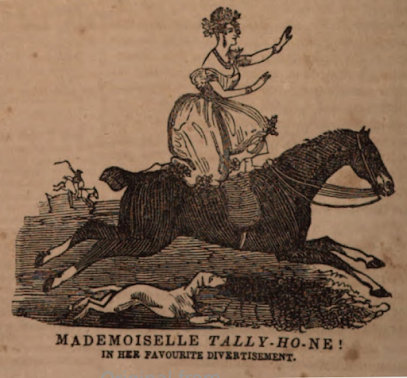Fanny Kemble (1809-1893)
Courtesy of the Metropolitan Museum of Art
In May of 1835, British actor Fanny Kemble experienced both the high and
low of celebrity. In Philadelphia on the day her long-awaited book about her
tour in the United States became available, excited fans rushed print shops and
crowded on street corners to hear Kemble’s words read out loud. They became
annoyed, however, as they heard her declare American shopkeepers too familiar
and horses ill-trained. Reviewers quickly criticized the book in print and a parody
called My Conscience! ridiculed
Kemble as spoiled. She immediately went from beloved artist to ungrateful sham.
As the New York Courier put it,
Kemble “acquired a reputation for talents she never possessed and an
eccentricity of character she only apes.”
Parodies of Fanny Kemble
Top: title page from My Conscience!
Bottom: image and poem by James Akin, courtesy of the Library of Congress
LC-DIG-pga-05108
Kemble squandered an amazing outpouring of goodwill for her talents by
publishing this frank assessment of the United States. Fans in cities all up
the Atlantic Coast went wild for her in the early 1830s. They sold out her
shows and showered her with flowers. Young women copied her fashion choices and
curled their hair in ringlets like she did. Anna Quincy attended five of her
performances in Boston, crying profusely at all of them. She wrote in her diary
after the last one: “As the curtain fell, I mentally took a final
adieu of the fair magician, who certainly has exercised some power over our
minds, and certainly during her performances, over our feelings. . . . So
farewell, Fanny Kemble, I thank you for the pleasure and the pain you have
given me. You will be long remembered.”
Fanny Kemble with ringlets
Courtesy of the Library of Congress
LC-D401-50289
Kemble affected men also. Admirers named race horses and tulips in her
honor. They mooned after her and wrote her love notes. She admitted in her
journal that these she had “treasured up as specimens of the purely funny in
composition, but which began to take up too much room” so she destroyed them.
Robert E. Lee, while a West Point cadet, found her irresistible. Lawyer Ralph
Lockwood wrote a novel just so he could dedicate it to her, asking in return
only for the opportunity to kiss her hand.
Kemble, however, just wanted to be left alone. She complained to a friend
in 1833 of the “dreadful unquietness” of her life as a celebrity. She preferred
the solitude of a scholar but she belonged to a great English family dynasty of
theater people. She was destined for the stage. Kemble debuted in 1829 in
London with no formal training and only a few weeks preparation; she was
nineteen years old. Her family was in economic trouble and they hoped she would
provide a spark of young talent. It worked. Kemble and her father set out in
1832 to conquer America and secure the family fortune. Peabody’s Parlour Journal out of New York City explained in 1834 just
how successful the venture had been:
“Such is the
brief but bright history of a young lady, who, though now only in her
twenty-second year, has acquired a lustre of enduring reputation of which we
have no example in the annals of her sex; difficult as it is to estimate how
much of the subtle essence of immortal fame, Time the great arbiter of destiny,
will distill over, from mere passing popularity. Yet a glance at the causes of
Miss Kemble’s celebrity, will enable us at once to see, that it is superior to
the ordinary influence of fluctuating notoriety, and in its very nature must
flourish in undecaying strength.”
Parody of Kemble on her morning ride.
Peabody’s Parlour Journal, Jan. 18,
1834
Kemble, however, did not want celebrity. She left the stage at the height
of her popularity to marry a rich American fan. She saw marriage as an escape
from work she had quickly grown to despise and that interfered with her
writing. Her husband, Pierce Butler, owned enslaved people and the pair fought
about this and other matters; they divorced in 1849. Kemble returned to the
stage for dramatic readings of Shakespeare, needing money on which to live. She
also published a dozen popular works of literature and memoir, most famously a Journal of a Residence on a Georgia
Plantation. She retained fame most of her life with newspapers reporting on
her activities. She never again, however, experienced the frenzy of the early
1830s and she liked it that way.
Sources
Butler,
Frances Anne [Fanny Kemble]. Journal.
2 vols. Philadelphia: Carey, Lea and Blanchard, 1835.
https://www.google.com/books/edition/Journal/TpurbS1BbvgC?hl=en&gbpv=1&dq=fanny+kemble+journal&printsec=frontcover
https://www.google.com/books/edition/Dec_1_1832_July_17_1833/oqoMAAAAYAAJ?hl=en&gbpv=1&dq=fanny+kemble+journal+%22volume+2%22&printsec=frontcover
https://www.google.com/books/edition/Journal/TpurbS1BbvgC?hl=en&gbpv=1&dq=fanny+kemble+journal&printsec=frontcover
https://www.google.com/books/edition/Dec_1_1832_July_17_1833/oqoMAAAAYAAJ?hl=en&gbpv=1&dq=fanny+kemble+journal+%22volume+2%22&printsec=frontcover
David, Deidre. Fanny
Kemble: A Performed Life. University of Pennsylvania Press, 2011.
“Fanny
Kemble’s Book.” Virginia Free Press,
May 21, 1835, 2 [reprint from New York Courier]. https://chroniclingamerica.loc.gov/lccn/sn84026784/1835-05-21/ed-1/seq-2/#date1=1832&sort=date&rows=20&words=Fanny+Kemble&searchType=basic&sequence=0&index=14&state=&date2=1835&proxtext=%22fanny+Kemble%22&y=0&x=0&dateFilterType=yearRange&page=3
Howe, Marc A. DeWolfe. “Young Fanny Kemble as
Seen in an Old Diary.” Atlantic Monthly 174 (December 1944): 97-102.
Jenkins, Rebecca. Fanny Kemble: A Reluctant Celebrity. New York: Simon and Schuster,
2005.
“Memoir
of the Dramatic Life of Miss Fanny Kemble” Peabody’s
Parlour Journal, January 18, 1834, 1-2; Feb. 1, 1834, 3; Feb. 15, 1834, 3. https://babel.hathitrust.org/cgi/pt?id=hvd.32044092842210&view=1up&seq=55&size=125
My Conscience!:
Fanny Thimble Cutler’s Journal of a Residence in America. Philadelphia:
Alexander Turnbull, 1835. https://babel.hathitrust.org/cgi/pt?id=loc.ark:/13960/t9d50x81z&view=1up&seq=9
Thanks for reading! Have a question or comment? Let me know! To subscribe, email angela.firkus@gmail.com




No comments:
Post a Comment